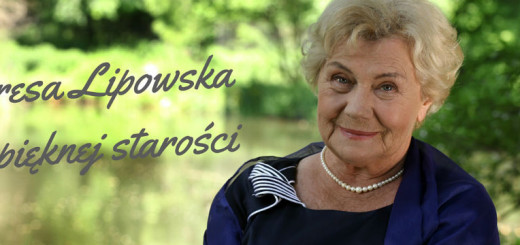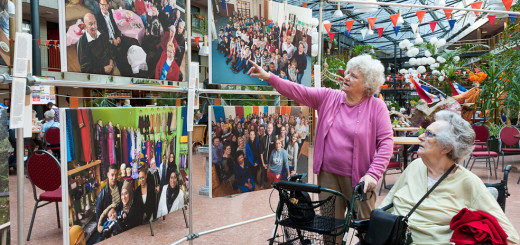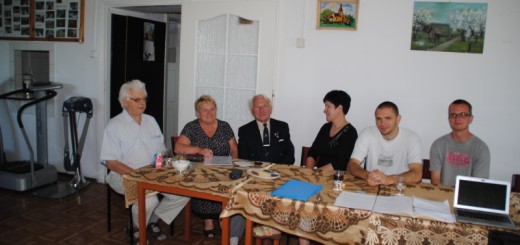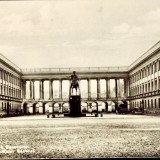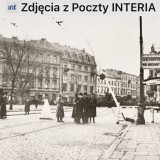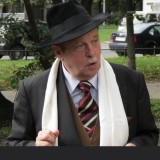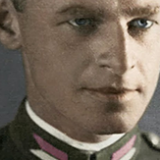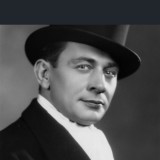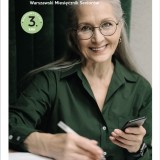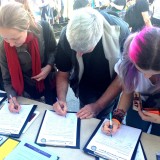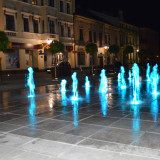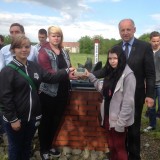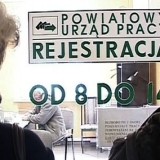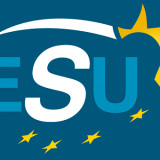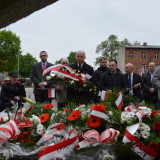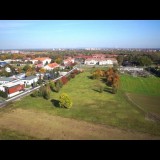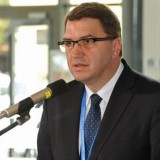Newsletter ESU 134
Dostępne tylko wersje w językach niemieckim i angielskim

EUROPÄISCHE SENIOREN UNION (ESU)
Newsletter „SENIOR INTERNATIONAL“ Ausgabe Nr. 134 (deutsch) 6. Juni 2016
EVP-Jubiläum mahnt zur Geschlossenheit
Manfred Weber, Präsident der Europäischen Volkspartei EVP/EPP, hat in Luxemburg zum Zusammenhalt der europäischen Länder aufgerufen. Anlässlich der festlichen Veranstaltung zum 40jährigen Bestehen der EVP/EPP erklärte er am 30. Mai: „Wenn wir nicht heute in Europa zusammenstehen, haben wir keine Chance in der Welt von morgen.“ Für den „Europäischen Lebensweg“ seien kulturelle Vielfalt und Tradition sowie Werte wie Demokratie und Menschenrechte „die beste Grundlage“. Zu den Gästen aus vielen Ländern gehörte die Präsidentin der Europäischen Senioren Union, em. Prof. Dr. An Hermans (Belgien). Über 70 Parteien aus 40 Ländern sind Mitglieder der EVP. Seit 1999 stellt sie die größte politische Gruppe (Fraktion) im Europaparlament.
Budapester Regionalkonferenz mit sportlicher Einlage Generalthema: „Aktives Altern und Teilhabe am Alltagsleben“
Von großem Vorteil erwies sich, dass zur ersten Regionalkonferenz in Ungarn am 26. und 27. Mai ESU und Robert-Schuman-Institut mehrere prominente Redner aus dem gastgebenden Land eingeladen hatten – Politiker und Wissenschaftler, die im Parlamentsgebäude an der Donau große Teile des ersten Konferenztages bestritten. Ihre Beiträge über die praktische Umsetzung der Seniorenpolitik „aus erster Hand“ waren äußerst informativ. Sie zeugten von einer Fülle von Schritten und Vorhaben, dem Leben der Älteren einen Sinn zu geben, ihr Wohlbefinden so lange wie möglich zu erhalten und bei Krankheit die nötige Fürsorge zu leisten. Ein Teil ihrer sozialen Maßnahmen stieß in der Diskussion auf Vorbehalte.
Was Staatssekretärin Katalin Novák, Prof. Dr. József Mészáros (Chef der Direktion für Rentenzahlungen) und die Abgeordnete der FIDESZ, Mónika Dunai, zum Thema „Aktives Altern und die Beteiligung von Senioren im Alltag“ vortrugen, nötigt Respekt ab.
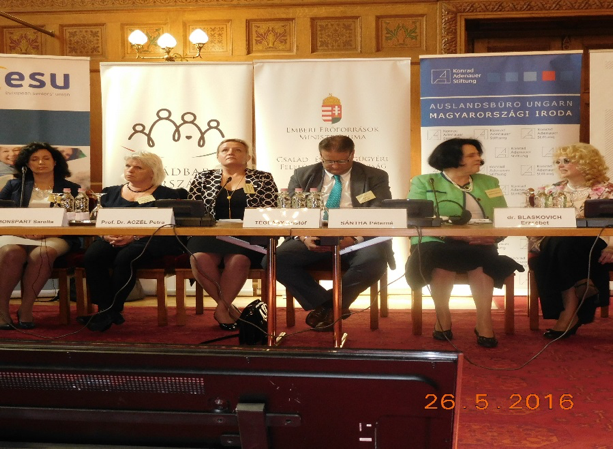
Für Frau Novák, die auch Vizepräsidentin des Seniorenrates ist, bedeuten die demographischen Trends „keine Last; wohl aber eine Herausforderung“, der sich Politik und Gesellschaft stellen. Dem gemeinsam verfolgten Ziel „Gesund alt werden“ dient neben anderem die Zusammenarbeit der Generationen. Der Realwert der Renten sei in den letzten Jahren gestiegen, die „Regiekosten“ (Grundnahrungsmittel, Miete, Strom…) sind gesenkt worden, und eine „Omi-Rente“ erlaube Frauen nach 40jähriger Beitragszahlung vorzeitige Altersbezüge, wenn sie Enkel betreuen möchten. Arbeitsplätze für über 55jährige seien sicherer geworden, und Behinderte hätten es jetzt leichter. Prof. Mészárós legt Wert auf regelmäßige Beitragszahlungen der Berufstätigen zur Erweiterung des staatlichen Rentenfonds. Das Renteneintrittsalter werde schrittweise von 63 auf 65 Jahre angehoben. Wie die Abgeordnete Dunai hervorhob, sei die Rente seit 2011 um 21 Prozent gestiegen (und beträgt durchschnittlich um die 470 Euro). 1500 der nachgefragtesten Medikamente sind um ein Drittel im Preis gesenkt worden. Neuerdings könnten auch Großeltern nach Geburt von Kindern in der Familie (Enkeln) ihre Berufstätigkeit unterbrechen. Frau Dunai endete mit dem Bekenntnis: „Ungarn will eine familienfreundliche Gesellschaft werden!“
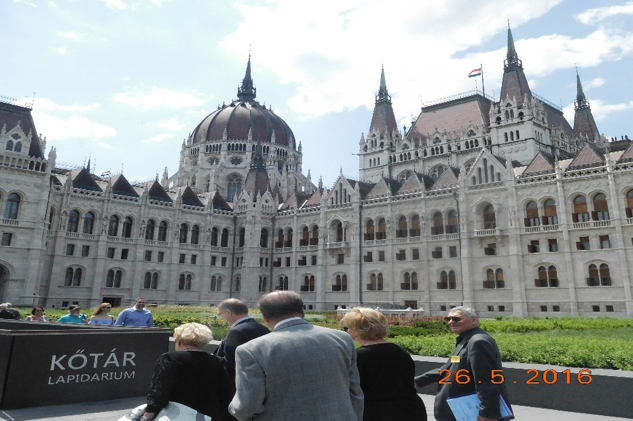
Teilansicht des Parlamentsgebäudes. Es wurde 1885 – 1904 von Imre Steindl im neogotischen Stil erbaut.Das Britische Parlament in London stand dem ungarischen Architekten dabei Pate. Unter der Kuppel wird die Stephanskrone mit den ungarischen Reichsinsignien aufbewahrtund von Militärangehörigen bewacht. Die Krone gilt als Symbol ungarischer Einheit. Die ursprüngliche Krone soll Papst Silvester II im Jahre 1000 dem ungarischen König Stephan II übnergeben haben, der kurz zuvor zum Christentum übergetreten war. Gegen Ende des 2. Weltkrieges gelangte sie in den Westen, später in die USA, die sie 1978 dem ungariuschen Staat zurückgaben. (Nach Wikipedia)
In einer zweiten Vortragsrunde kamen Ergebnisse zur Sprache, die der Seniorenrat mit seinen drei Srbeitsgruppen erreicht hat. Für die Geriaterin Dr. Erzsébet Blaskovich zählt, dass seit 2010 immerhin 160 geriatrische Betten eingerichtet wurden, doch die inzwischen ausgebildeten 30 Fachärzte reichten nicht aus. Sie setzt sich für die Förderung des „aktiven Alterns“ ein. Èva Body ist um die Betreuung von Demenzkranken besorgt. So wurden die Kommunen verpflichtet, die daheim Betreuten mit Essen zu versorgen. Vorgesehen sei, demente Heimbewohner durch Behandlungen vor Ort möglichst vor einem Klinikaufenthalt zu bewahren.
„Sport frei!“
Mit dem Auftritt von Sarolta Monspart kam Bewegung in den mit 180 Gästen gefüllten Saal, denn die ehemalige Präsidentin des Nationalen Olympischen Komitees ließ es nicht bei aufrüttelnden Worten zu mehr Freizeitsport, sondern erteilte vor Ort praktischen Unterricht. Ihrer Aufforderung , sich für einige Entspannungsübungen zu erheben, folgten schließlich sogar die übrigen Podiumsmitglieder! Mit Modeerscheinungen ging sie hat ins Gericht. Wenn mit Smartphones gespielt statt geküsst und Sex gemacht wird, fragte sie verschmitzt ins Plenum: „Wo kommen denn da die Kinder her ?“ Sie hielt ein Plädoyer für lebenslange körperliche und geistige Fitness und mahnte „zu kochen, was nötig ist und nicht, was die Männer wollen“.
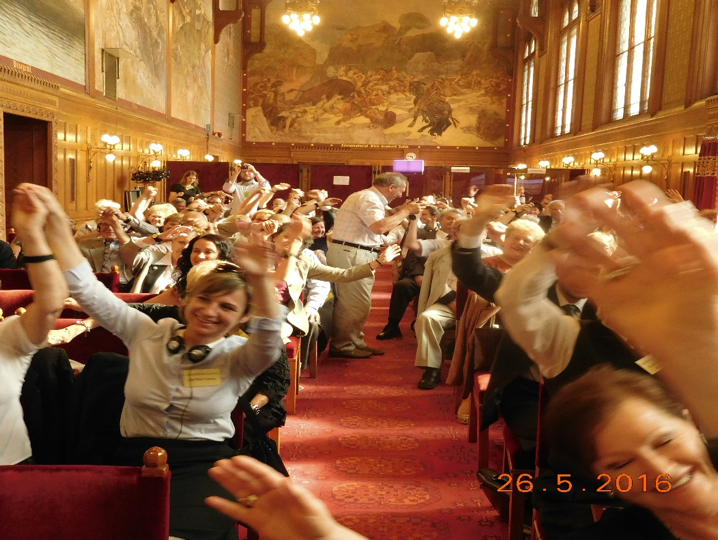
Eine Sportlerin bringt 180 Personen auf Trab („Die Konferenz turnt“)
Für Prof. Dr. Petra Aczél von der Kath. Universität ist die Vernachlässigung von Kindern, Jugendlichen und Alten in den Medien nicht hinnehmbar. So werde verleugnet, „was wir zur Verlängerung des Lebens tun“. Haben diese Presseleute vergessen, fragte sie, „dass es ihre Oma war, also eine Seniorin, bei der sie auf dem Schoß saßen?“ In diesem Zusammenhang ist erfreulich zu erfahren, dass jetzt gute journalistische Arbeiten über Familien und – ab 2017 – über Ältere mit einer hoch dotierten Auszeichnung versehen werden, worüber Imre Nyitrai zu berichten wusste. Mit einer Fülle von Beispielen belegte die Vize-Bürgermeisterin des 8. Budapester Distrikts, Pétérne Sántha, wie vielseitig das Angebot an die Senioren in der Kommune sein kann. Es werde davon reger Gebrauch gemacht, stellte sie erfreut fest. Häufig sind diese Initiativen den überall existierenden Seniorenräten zu danken. Tamás János Schánda, stellv. Staatssekretär, schließlich brach als Jugendpolitiker eine Lanze für ein Geben und Nehmen zwischen den Generationen; beide zögen Vorteile daraus, und dem Zusammenhalt der Familien täte es gut. Als Diskussionsrednerin knüpfte Marilies Flemming, Mitglied des Exekutivkomitees aus Österreich, daran an und verlangte „Gleiches Recht für Alt und Jung“. In Verlautbarungen der UNO, stellte sie fest, werde der Begriff „Familie“ leider äußerst selten verwendet. Die Präsidentin des Schuman-Instituts, Doris Pack aus Deutschland, regte an, sich das in ihrer Heimat erfolgreich eingeführte „Projekt „Mehrgenerationenhaus“ einmal auf seine Brauchbarkeit in Ungarn und anderswo anzuschauen. (Auf ihre Ausführungen zu Gemeinsamkeiten und Unterschieden europäischer Identität kommen wir in der nächsten Ausgabe zurück.) Moderator Tünde Fürézs, Stellv. Staatssekretär, und ESU-Präsidentin An Hermans zogen für die Vorträge und Aussprache eine positive Bilanz. Einleitend hatte Prof. Dr. Hermans für die ESU die Funktion einer „Brücke zwischen den Generationen“ hervorgehoben, was den Austausch von Erfahrungen einschließe. Nicht allein für die das Wohlbefinden der Ä l t e r e n fühle sich die ESU verantwortlich, sondern für die Gesamtheit der Gesellschaft. Die Basis dafür sei die Bewahrung des Friedens und die Stärkung der europäischen Integration in Demokratie, Freiheit und Solidarität.
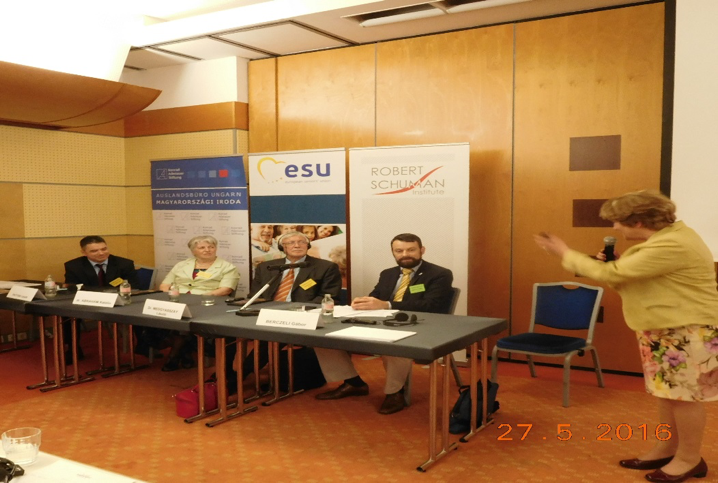
Die ESU-Präsidentin An Hermans dankt Vortragenden des 2. Konferenztages. Von links: László Patyán, Katalin Ábrahám, László Medgyasszay, Gábor Berczelli (Moderator)
Am zweiten Konferenztag…
…versammelten sich Delegierte aus zahlreichen ESU-Mitgliedsverbänden und Gäste aus Ungarn im Hotel Mercure Buda. Nach einer geschlossenen Sitzung des Exekutivkomitees kamen Themen zur Sprache, die die tags zuvor erklärten Positionen ergänzten. Das eingangs gezeigte Video mit Äußerungen von An Hermans (BE), Anne Velliste (EST), Elmar Brok und Bernhard Worms (beide DE) sowie Heinz K. Becker (AT) stimmt nachdenklich: Hier werden biographische Erlebnisse aus Kriegs- und Diktaturzeiten (Valliste) mit Positionsbestimmungen zu aktuellen Vorgängen verbunden – ein Projekt zur 20-Jahrfeier der ESU im Herbst 2015. Die vom früheren ESU-Präsidenten Dr. Worms gegen Ende gesprochenen Worte „Der Kampf aller gegen alle führt zum Untergang Europas“ klingen nach… Die von ihm Ende April (SI berichtete) ins Leben gerufene “Stiftung Alt und Jung für Europa“ verfolgt das entgegengesetzte Ziel: wissenschaftliche Arbeiten zu honorieren, die die Integration unseres Kontinents zum Inhalt haben, wie Worms erläuterte. Auf historische Entscheidungen von Adenauer, Bush sen., Kohl und Gorbatschow zurückgreifend, stellte er die „persönliche Authentizität“ als einen herausragenden Aspekt für erfolgreiche Verhandlungen heraus. Bei der Frage „Wie soll es weitergehen und welches Europa wollen wird?“ komme ihm immer wieder die von der ESU verabschiedete „Magna Charta“ in den Sinn, deren Akzeptanz für alle Mitgliedsverbände verbindlich ist Prof. Dr. Steven Van Hecke, Leuven (BE), sprach sich in diesem Kontext für kurz- und langfristige Lösungen aus. Allen Bedenken gegenüber dem aktuellen Bild der EU zum Trotz gelte es festzustellen: „Die Vorteile der EU überwiegen !“ Im Unterschied zu Russland und zur Türkei, wo eine Person entscheidet, haben wir uns der demokratischen Willensbildung verschrieben. Allerdings seien die Älteren z.B. im EU-Parlament insgesamt unterpräsentiert; die „Grünen“ hätten viele j u n g e Abgeordnete ins Rennen geschickt. Mit Csaba Farago trat ein weiterer j u n g e r, aus Ungarn stammender Teilnehmer ans Pult. Er war kürzlich als Stellvertretender Vorsitzender der EVP-Jugendorganisation YEPP wiedergewählt worden. Wie einige Vorredner sieht er „ohne stärkere Zusammenarbeit keine Zukunft für die EU“. Mit dem österreichischen Außenminister Kurz wolle seine Organisation über die geplante Abschottung gegen Asylsuchende an der Grenze zu Italien sprechen. In einer Diskussionsrunde mit Józef Miklosko (SK), der von 405 Euro durchschnittlicher Rente für seine Landsleute sprach, Astrid Lulling (LU), Claus Bernhold (DE), Marilies Flemming (AT), Vizepräsidentin Dr. Gabriele Peus-Bispinck (DE), Lidmila Nemcova (CZ), Vizepräsidentin Dr. Christine von Stefenelli (IT/Südtirol) und Dr.Bernhard Worms (DE) wurden die Sorgen um Europas Zukunft artikuliert und Wege aus der Vertrauenskrise erörtert. Frau von Stefenelli sprach sich gegen Grenzzäume am Brenner aus und mahnte – wie hernach auch eine Delegierte aus der Vojvodina (ungarisch Vajdasag), der nördlichsten Provinz Serbiens ,von den Politikern mehr Aufmerksamkeit für Minderheiten an. Prof. László Patyán aus Debrecen, Geriater, u.a. in der Platform AGE engagiert, legte in seinem Vortrag den Finger auf einige Wunden , darunter die geringen Chancen Älterer auf dem ungarischen Arbeitsmarkt (drittletzter Platz, Polen ist Schlusslicht). In seinem Land seien die Seniorenräte zwar meinungsbildend, aber ohne Entscheidungsbefugnis. Für die Partizipation älterer Bürger sieht der Mediziner Faktoren wie Wohngegend (Stadt / Land), Bildungsstand, Höhe der Altersbezüge, gesundheitliche Verfassung und andere für wesentlich an. Erfahrungen über „aktives Altern“ sollten europaweit verbreitet werden. Seine Feststellung: „In Osteuropa sind viele Senioren allein, weil ihre Kinder in Westeuropa Senioren pflegen“ stimmte nachdenklich. Dr.Katalin Ábrahám, Vorsitzende der Nationalen Senioren-Assoziation in einem Budapester Stadtbezirk, ist vom Vorteil eines kommunal finanzierten „Programms 60 plus“ in Verbindung mit einer „Rabattkarte“ und „Lebenslangem Lernen“ (an der Seniorenakademie) mit 2000 Teilnehmern überzeugt.100 freiwillige Helfer ermöglichen die Umsetzung. Auf Nachfrage erklärte sie: „Die Renten sind sicher, der Arbeitsplatz nicht!“ Dass ungarische Minderheiten in Nachbarländern „einen Überlebenskampf“ führen müssen, sieht sie kritisch. Kritisch äußerte sich in der Diskussion auch Astrid Lulling aus Luxemburg zu Berichten über Rabatte für einige Lebensmittel, Arzneikosten, Mieten, Strom und andere sogenannte Regiekosten. Ihrer Meinung nach sollte die weitere Erhöhung der doch noch sehr niedrigen Renten in den Mittelpunkt der Seniorenpolitik gerückt werden. Damit würden staatliche und/oder kommunale Hilfen zur Finanzierung des Alltags der Älteren entbehrlich. Es sei auch eine Sache der Würde, dass die älteren Bürger mit auskömmlichen Altersbezügen über die Verwendung ihrer Mittel eigenständig entscheiden können. Dr. László Medgyasszay, u.a. Präsident der Zoltan-Seniorenorganisation, kleidete seine Hoffnung für die Zukunft des Kontinents in den Satz: „Möge es ein christliches Europa bleiben!“ Und stellte die Frage „Was erwarten wir von einem Europa, das gleichgeschlechtliche Ehen gestattet?“ An historische Erfahrungen anknüpfend, stellte der reformierte Christ fest: „Wir wollten immer zu Europa gehören. Es stört mich, wenn westliche Politiker harte Worte (über sein Land) sprechen; sie wollen uns ausgrenzen.“ Die ESU-Präsidentin Prof. An Hermans sagte in ihrem Schlusswort: „Wir streben ein Europa an, das offenen Umgang miteinander pflegt und sich länderübergreifend unterstützt, in dem sich auch Arme und Behinderte zu Haus fühlen.“ Die erfolgreiche Regionalkonferenz sei vor allem dem Zusammenwirken der ESU mit dem Robert-Schuman-Institut in Budapest, der Konrad-Adenauer-Stiftung und der Parlamentsfraktion der FIDESZ zu danken. Mit einer Video-Präsentation über Naturschönheiten und weitere Sehenswürdigkeiten von Larnaca und Umgebung (Zypern) klangen die Beratungen aus. Die auswärtigen Gäste hatten Gelegenheit, auf einer Schiffsfahrt das herrliche Budapest von der Donau aus zu bewundern.
ESU vor Erweiterung
Der Seniorenverband Armeniens hat gute Chance, den Beobachterstatus der ESU zu erlangen. Über seinen Antrag werde das Präsidium Anfang Juli Wien befinden, erklärte Generalsekretär Guido Dumon vor dem Exekutivkomitee in Budapest im Beisein von Hovsep Khiryshudyan aus Jerewan.Seine 2014 gegründete Organisation ist in der “Östlichen Partnerschaft“ aktiv, zu der sich politische Kräfte aus Armenien, Aserbaidschan, Belarus, Georgien, Moldawien und Ukraine zusammengeschlossen haben. Wie weiter verlautet, ist zeitnah mit der vollen Mitgliedschaft für die Senioren der Niederländischen Partei Christlich-Demokratischer Appell (CDA) zu rechnen, die seit Jahren ESU-Beobachter sind und sich nun zum nächsten Schritt entschlossen haben.
ESU vor weiteren Konferenzen
Sowohl die Sommerakademie in Wien (1./2. Juli) als auch die (erste) Regionalkonferenz in Slowenien (Ljubljana 21./22.Oktober) und erst recht der Wahlkongress in Leuven (BE, 4./5.November) werden die Zukunft Europas und den Platz der Senioren in der sich wandelnden Gesellschaft thematisieren, erklärte ESU-Präsidentin An Hermans am 27. Mai vor dem Exekutivkomitee. Zur Sprache kommen sollen auch die außerhalb Europas bestehenden Konflikte. Einer Mitteilung von Marilies Flemming (AT) zufolge wird der Vorsitzende des Auswärtigen Ausschusses im Europaparlament, Elmar Brok (DE) wie im Vorjahr zur Sommerakademie in Wien als Referent erwartet. In die Jahresplanung für 2017 hat die ESU Regionalkonferenzen in Tschechien und Norwegen aufgenommen. Vizepräsidentin Lidmila Nemcova (Prag) und Sverre Mauritzen (Oslo) wollen die „Zusammenarbeit der Generationen“ thematisieren. Der norwegische Konferenztermin wird in der 2. Jahreshälfte liegen. Auch die Polnische Senioren Union (PUS) hat Interesse an einer Konferenz bekundet.
Budapest: Wortmeldung deutscher Konferenzgäste
Für uns „ Ältere, die wir Krieg, Flucht und Vertreibung noch erlebt haben, ist das Zusammenwachsen der europäischen Staaten zu einer Werte-, Währungs- und Sicherheitsgemeinschaft eine der wichtigsten Erlebnisse“, heißt es in einer Erklärung deutscher Konferenzgäste, die diese Errungenschaften in Gefahr sehen und daher in Budapest feststellen: „Europas Chance auf Frieden liegt in der Gemeinsamkeit des Handelns.“ Statt Abschottung und Zäune sind gemeinsame Anstrengungen zur Bekämpfung der Ursachen für die gegenwärtigen Asylantenströme wie auch für die gerechte Verteilung der Hilfesuchenden gefragt. Die ESU als Seniorenorganisation der Europäischen Volkspartei sollte „die Politiker in der EU auffordern, sich noch stärker dem kulturellen, religiösen und humanistischen Erbe Europas mit den unverletzlichen und unveräußerlichen Rechten des Menschen“ verpflichtet zu fühlen. C.B./U.W.
Was tschechische Senioren bewegen / Von Doz. Lidmila Nemcova
Der Tschechische Verband Christlicher Senioren (SKS) hat begonnen, tiefer über das nationale und internationale Antlitz der Zukunft nachzudenken und bringt dazu grundlegende Ideen der Christlichen Soziallehre in die Diskussion ein. Bekanntlich ist Präsident Vaclav Roubal zugleich Vizepräsident des Tschechischen Seniorenrates (RSCR); SKS- und ESU-Vizepräsidentin Lidmila Nemcova engagiert sich in verschiedenen Beratungsorganen des Parlaments, und Vaclav Nemec, der Roubal berät, repräsentiert den Seniorenrat im Rat der Regierung für kontinuierliche Entwicklung. Übrigens :Lediglich drei weitere Mitglieder des Seniorenrates sind in einem anderen Rat für Probleme des Alterns tätig. Die genannten Persönlichkeiten des SKS nahmen am 25. April eine vom Seniorenrat organisierte und international besetzte Seniorenkonferenz auf der Prager Burg zum Anlass, die Christlichen Werte hervorzuheben. Die Begegnung stand unter der Schirmherrschaft des Staatspräsidenten. Das Wort nahmen sowohl führende Vertreter von Seniorenorganisationen aus Österreich, Belgien, Deutschland und Slowakei als auch tschechische Regierungs- und Parlamentsmitglieder. Zur Diskussion stand der Entwurf des neuen tschechischen Senioren-Gesetzes, das vom Seniorenrat vorbereitet wurde und sich das erfolgreich praktizierte entsprechende Gesetz in Österreich zum Vorbild nimmt. Die Begegnung führte zu neuen informellen internationalen Kontakten. Die SKS – sie ist seit weit über 10 Jahren Mitglied der ESU – beteiligt sich auch an Diskussionen über die künftige Lebensqualität der älteren Bürger, über die Zusammenarbeit zwischen den Generationen und Solidarität sowie über die Stellung von Senioren in der Gesellschaft. Dazu gibt es Gelegenheit bei Round-Table-Gesprächen der Regierung über die weitere Entwicklung des Landes bis 2030. Daran beteiligen sich Persönlichkeiten mit unterschiedlichem Hintergrund und Position. Es sind nicht nur Experten und Intellektuelle, sondern auch Vertreter diverser NGO’s, aus Kommunen und der Zivilgesellschaft
Herzliche Gratulation
Zum 90. Geburtstag des SKS-Präsidenten Dr. jur. Vaclav Roubal am 14. Juni entbietet der „SI“-Redakeur seinem Prager Freund herzliche Grüße und die besten Wünsche. Mit seinem jahrzehntelangen politischen Wirken ist er zum Vorbild für viele seiner Landsleute und weiterer Persönlichkeiten in Europa geworden. Er führte seinen Seniorenverband in die ESU und gehörte über einen längeren Zeitraum dem ESU-Präsidium als Vize-Präsident für die osteuropäischen ESU-Mitgliedsstaaten an. Im Verlaufe der Wiener Sommerakademie nimmt der im In- und Ausland geschätzte Politiker
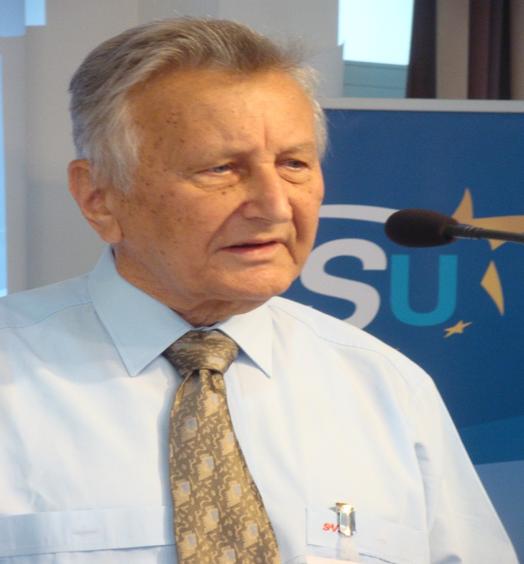
Der Jubilar an seinem 88. Geburtstag in Wien (2014) regelmäßig das Wort und mahnt, den Christlichen Werten im politischen Handeln mehr Bedeutung zu geben.
Zypern nach den Parlamentswahlen /Nach Infos von Antonios Demetriades
Mit fast 31 % der Wählerstimmen kam die Partei Democratic Rally am 22. Mai auf Platz 1. Die Freude über das Abschneiden hält sich beim Vorsitzenden des Rally-Seniorenbundes, Antonis Demetriades, in Grenzen, da nur rd. 67 Prozent der Wähler zu den Urnen gingen – so wenige wie nie zuvor beim Parlamentswahlen. Überdies benötigt die Democratic Rally zur Regierungsbildung einen Koalitionspartner. Auf Platz 2 gelangten die Kommunisten (AKEL) mit über 25 Prozent (Verlust von 7 %). Unter den vier neu ins Parlament einziehenden Parteien ist eine ultrarechte, die 2 Sitze (von 56) errang. Die Zahl der weiblichen Abgeordneten habe sich erfreulicherweise von 7 auf 11 erhöht, betont Demetriades, der auch ESU-Vizepräsident ist. Inzwischen hat sich Staatspräsident Nicos Anastasiades in einem Interview über die Verhandlungen zur Wiedervereinigung seines Landes verhalten positiv geäußert. Zwar habe es Fortschritte gegeben, aber eine Reihe wichtiger Fragen seien bislang ungeklärt. Der Präsident, der einst den Seniorenverband gegründet hatte, äußerte die Überzeugung, dass ein einheitliches Zypern für das eigene Land, für die Türkei sowie die Beziehungen von EU und NATO zur Türkei Vorteile brächte. Die wirtschaftliche Erholung der Republik Zypern bezeichnete der Präsident als eine „Erfolgsstory“, mit der die nationale Souveränität gestärkt wurde.
Eindrücke meiner Polen-Reise/von Margit Hawkes
Die Stationen meiner Reise waren Wroclaw, Lodz, Katowice und das Dr.Korczak-Kinderdorf Rajsko am Rande von Oswiecim, das vom Ehepaar Marta und Janusz Marszalek (Vorsitzender der Senioren-Union PUS und ESU-Vizepräsident) geleitet wird. Als Mitglied des ESU-Exekutivkomitees ging es mir diesmal vorrangig um die Senioren-Union in Wroclaw/Breslau. Wie mein Schulkollege Rechtsanwalt Malicki versicherte, dürfte der Registrierung dieser neuen Gruppe nun nichts mehr entgegenstehen; eine Anpassung der PUS-Statuten erleichtere das Prozedere. In der Europäischen Kulturhauptstadt 2016 Wroclaw erfuhr ich des Weiteren, dass es für die ältere Bevölkerung viele Möglichkeiten zur Information und gesellschaftlichen Teilhabe gibt. Unter der Webadresse www. seniorzy.wroclaw.pl/o-nas kann das monatlich erscheinende „Biuletyn informacyjny“ abgerufen werden. Seit 2014 ist der nun in ganz Polen bestehende Seniorenrat auch hier tätig (Wroclawska Rara Seniorów). Darüber hinaus bietet ein „Forum Club Seniora“ Anregungen zur Freizeitbeschäftigung und Hilfe in Alltagsfragen. 40 Jahre Senioren der Moderaten/von Bertil Persson „Moderata Seniorer“ in Schweden ist 1976 durch den Zusammenschluss von drei Seniorenclubs in den Städten Malmö, Uppsala und Gothenburg entstanden. Sie alle gehörten zur Högepartie (Right Party) – jetzt die „Moderate Partei“. Die Moderaten führten die Regierung 2006 – 2014, und Umfragen zufolge sind wir die stärkste Partei in Schweden, jetzt unter dem Vorsitz von Anna Kinberg Batra. Die Moderaten Senioren haben über 80 örtliche Clubs – über das ganze Land verteilt , die mit ihren Parteiorganen vor Ort zusammenarbeiten. Wir sind im zentralen Parteivorstand präsent. Gegenwärtig gehören 46 % der Parteimitglieder unserer sehr aktiven Organisation an. Weil Schweden nicht in den 2. Weltkrieg einbezogen war, sind die vielen in den 40er Jahren Geborenen mit 25 % zahlreicher als andere Generationen. Unser 40jähriges Bestehen wurde am 20. Mai im Rahmen der traditionellen „Schwedentage“ der Partei auf dem Messegelände von Malmö mit 1300 Delegierten begangen. Zu unserer Freude hat uns die Präsidentin der ESU, Prof. An Hermans, persönlich gratuliert und über das Wirken der ESU berichtet. Von unserer Seite hat der frühere Vorsitzende, Inger Koch, über den 40 Jahre währenden Einsatz für die Älteren gesprochen. (Bertil Persson ist Vorsitzender des Seniorenverbandes und Mitglied des ESU-Exekutivkomitees)
Belarussische Senioren fordern gemeinsames Handeln
Im Bulletin der Seniorenorganisation „Unsere Generation“ /“Nashe Pokalene“ wird auf Russisch über die Gründung der Stiftung „Alt und Jung für Europa“ berichtet. (siehe Nr.133). Dabei wird die Vorsitzende, Tatjana Zelko, zitiert, die in der Festveranstaltung am 29. April in Brauweiler (DE) in einer Video-Präsentation die „Östliche Partnerschaft“ (EaP) vorgestellt und dabei für eine Kooperation der EaP mit der ESU geworben hat. Darüber hinaus habe sie gemeinsames Handeln der europäischen Staaten zur Überwindung der Krisensituationen gefordert; denn nur so könnte auch „den Gefahren an unseren Grenzen“ widerstanden werden, heißt es im Bulletin. (Frau Zelko ist Mitglied des Exekutivkomitees der ESU).
Money…Money…Money
Für die europäische Stiftung “Jugend und Alter für Europa“, die am 29. April der Öffentlichkeit vorgestellt wurde, konnten die ersten Aktionäre gewonnen werden; von ihnen wird ein Jahresbeitrag von mindestens 1000 Euro erwartet. Das ESU-Exekutivkomitee hat beschlossen, die Höhe der von den Organisationen zu leistenden Mitgliedsbeiträge trotz fehlender Einnahmen (ausnahmsweise) auf dem Niveau des Vorjahres zu belassen. Von den für 2015 geplanten Einnahmen wurden nur 84 Prozent erzielt, da drei Mitgliedsverbände und zwei Beobachter die Beiträge – teils schon seit 3 Jahren – schuldig geblieben sind. Somit ist der finanzielle Spielraum der ESU begrenzt. Für die Neugestaltung der Website ist im Budget der ESU die einmalige Zahlung von 7000 Euro vorgesehen. ___________________________________________________________________________ Impressum Redaktion : ulrich.winz@web.de; Zuschriften bitte an diese Adresse ! ESU: Rue de Commerce 10, 1000 Brussels; Tel.:+32 23092866; E-Mail: esu@epp.eu; Website: http://www.esu-epp.eu ; Facebook.com/esu.eu

EUROPEAN SENIORS‘ UNION (ESU)
Newsletter “SENIOR INTERNATIONAL” Issue No. 134 6th June 2016
EPP Jubilee urges unity
In Luxembourg, Manfred Weber, President of the European People’s Party EPP, called for solidarity among European countries. On the occasion of a festive event for the 40th anniversary of the EPP, he stated on 30th May: “If we do not stand together now in Europe, we have no chance in the world of tomorrow.” For the “European journey through life”, cultural diversity and tradition and values such as democracy and human rights are “the best basis”. Among the guests from many countries was the President of the European Seniors’ Union, em. Prof. An Hermans (Belgium).
Over 70 parties from 40 countries are members of the EPP. Since 1999, it represents the largest political group in the European Parliament
Budapest Regional Conference with sporty supplement
General Topic: Active Ageing and the Participation of Seniors in Everyday Life
For the first regional conference of the European Seniors’ Union (ESU) in Hungary, which together with the Robert-Schuman-Institute, took place on 26th and 27th May, prominent speakers from the host country were invited. These politicians and scientists determined large parts of the first day in the parliament building on the Danube. The “first-hand” contributions about the practical implementation of the policy for the elderly were informative. They bore witness to a wealth of steps and projects to give the life of the elderly a meaning, to keep their well-being as long as possible and to provide the necessary care in case of illness. In the discussion, part of their social measures were received with reservations.
What the State Secretary, Katalin Novák, Prof. Dr. József Mészáros (head of the Department for Pension Payments) and the Fidesz MP, Mónika Dunai, stated about the topic “active ageing and the participation of senior citizens in everyday life” commands respect.

Speakers from the first day of the conference
From left: Katalin Novák, Sarolta Monspart, Petra Aczel, Tamás János Schanda, Pétérne Santha, Erzsébet Blaskovich
For Mrs. Novák, who is also Vice-president of the Seniors’ Council, the demographic trends mean “no burden, but rather a challenge” for the politicians and society. The common goal to pursue “becoming old healthily” serves among other things the cooperation between generations.
The real worth of the pension has risen in the last years, the “basic costs” (food, rent, electricity…) have gone down, and a “mother’s pension” allows women an earlier pension after 40 years of contributions if they want to care for their grandchildren. Employment possibilities for the over-55’s have been secured, and for the disabled it is now also easier.
Prof. Mészárós attaches importance to regular payment contributions from the employed to supplement the state pension. The age of retirement will be increased in steps from 63 to 65 years.
As the MP Dunai said, the pension has risen since 2011 by 21 percent (and amounts to an average of about 470 Euro). 1,500 of the most demanded medicines have dropped in price by one third. Recently, grandparents can also take a break from their employment after the birth of children in the family (grandchildren). Frau Dunai concluded with the belief that “Hungary wants to become a family-frendly society!”.

A partial view of the Parliament building. It was built 1885-1904 by Imre Steindl in the neo-gothic style. The British Parliament in London stood as the “father” for the Hungarian architect. Under the dome, the Crown of St. Stephen, with the imperial Hungarian insignia, is guarded by members of the armed services.
In a second round of presentations, the results achieved by the three working groups of the Seniors’ Council were discussed.
What counts for the geriatric specialist, Dr. Erzsébet Blaskovich is that 160 geriatric beds have been established since 2010, but that the meanwhile 30 fully-trained specialist doctors are not enough.
Èva Body is concerned with the care of those with dementia. The local authorities are obliged to provide meals to those in care living at home. It is foreseen to provide local care for dementia patients living at home in order to avoid a hospital stay where possible.
With the appearance of Sarolta Monspart, movement came to the hall filled with 180 guests. After a rousing speech about recreational sport, the former president of the National Olympic Committee called for some soothing relaxation exercises, which nobody could or liked to resist.
She criticised the modern fashions. If they played with Smart-phones instead of kissing and making love, “where will the children come from?” she asked the audience. She advocated lifelong physical and mental fitness and warned women “to cook what is necessary and not what the husband or partner wants”.

A sports lady brought 180 people into movement (“The conference does gymnastics”)
For Prof. Dr. Petra Aczél from the Catholic University the neglect of children, young people and the elderly in the media is not acceptable. Thus they deny “what we do to prolong life”. Have the journalists forgotten, she asked, “that is was their grandmother, a senior, on whose lap they once sat?” In this connection, it is pleasing to learn that now every good journalistic work about families and – from 2017 – about the elderly, will be honoured with a high remuneration, about which Imre Nyitrai reported.
With a number of examples, the Deputy-Mayor of the 8th district of Budapest, Pétérne Sántha, illustrated how varied the offers can be for seniors in the community. These are used frequently, she was pleased to say. Often, these initiatives are thanks chiefly to the ubiquitous existing Seniors’ Councils.
Tamás János Schánda, deputy state secretary; as a young politician, he bridges a connection for a give and take between the generations; which are of advantage for both and which can be good also for the cohesion of the family.
This was followed up by Marilies Flemming, a member of the Executive Committee from Austria, who has demanded “the same rights for old and young.” She realized that in the announcements of the UNO, the concept of “Family” unfortunately is not often used.
The President of the Schuman-Institute, Doris Pack from Germany, suggested looking at a successfully managed project, the “multiple generation house” in her country, for its usefulness in Hungary and elsewhere (her explanation about the similarities and differences of European identity will be dealt with in the next issue). Presenter Tünde Fürézs, Deputy State Secretary, and ESU President An Hermans, gave a positive assessment of the speeches and debates.
In her introduction, Prof. Dr. Hermans has emphasised the function of the ESU as a “bridge between the generations,” which includes the exchange of experiences. The ESU feels responsible not only for the well-being of the elderly but for the whole of society. The basis for this is the preservation of peace and the strengthening of European integration in democracy, freedom and solidarity.

The ESU President An Hermans thanked the speakers on the 2nd day of the conference
From left: László Patyán, Katalin Ábrahám, László Medgyasszay, Gábor Berczelli (presenter)
On the second day of the conference delegates from numerous ESU member associations and guests from Hungary gathered in the Hotel Mercure Buda. After a closed session of the Executive Committee, topics were discussed that supplemented statements declared the day before. It began with a video presentation with thought-provoking statements by An Hermans (BE), Anne Velliste (EST), Elmar Brok and Bernhard Worms (both DE), as well as Heinz K. Becker (AT): here were biographical experiences of war and dictatorship (Velliste), connected with opinions about current affairs – a project for the ESU’s 20th anniversary in the autumn of 2015. The words of former ESU President Dr. Worms, spoken at the conclusion, “the struggle of everyone against everyone leads to the downfall of Europe “ still resounds….
The “Youth and Seniors for Europe Foundation”, launched by him at the end of April (as reported by SI), pursues the opposite goal: to reward scientific work that has the integration of our continent as its content, as Worms explained. Referring to historic decisions made by Adenauer, Bush senior, Kohl and Gorbachev, he put “personal authenticity” as an essential aspect of successful negotiations. When asked “how should it continue and what Europe do we want?”, he is reminded repeatedly of the “Magna Carta” adopted by the ESU, the acceptance of which is binding for all member associations.
Prof. Steven Van Hecke, Leuven (BE), spoke in this context about short and long-term solutions. Despite all the concerns about the current picture of the EU, the fact is: “the advantages of the EU predominate”. In contrast to Russia and Turkey, where one person decides, we are committed to a democratic decision-making process. However, the elderly are under-represented in the European Parliament; the “Greens” have sent many young MPs “into the race”.
With Csaba Farago, another young participant, originally from Hungary, came to the lectern. He has been recently re-elected as Deputy Chairman of the EPP-youth organization, YEPP. Like the previous speaker, he sees “no future for the EU without stronger cooperation”. His organisation wanted to speak to the Austrian Foreign Minister, Kurz, about the planned barriers against asylum seekers at the border with Italy.
In a discussion with Józef Miklosko (SK), who spoke about the average pension of 405 Euros for his countrymen, Astrid Lulling (LU), Claus Bernhold (DE), Marilies Flemming (AT), Vice-president Dr. Gabriele Peus-Bispinck (DE) Lidmila Nemcova (CZ), Vice-president Dr. Christine von Stefenelli (IT / South Tyrol) and Dr. Bernhard Worms (DE), concerns about the future of Europe were articulated and ways out of the crisis of confidence were discussed. Mrs von Stefenelli spoke out against the border fences at the Brenner and warned – as afterwards also did a delegate from Vojvodina (Hungarian Vajdaság), the most northern province of Serbia, that the politicians should pay more attention to minorities.
Prof. László Patyan from Debrecen, a geriatrician engaged with the AGE Platform among other things, put his finger on some wounds in his lecture, including the low chances of the elderly in the Hungarian labour market (third from last place, Poland is last). In his country, the Seniors’ Councils were indeed opinion-formers but without any decision-making power. For the participation of seniors, the doctor saw residential area (urban/rural), level of education, level of retirement benefits, health condition and others as essential. Experience about “active ageing” should be disseminated throughout Europe. His assessment: “in Eastern Europe, many seniors are alone because their children are looking after seniors in Western Europe” is thought-provoking.
Dr. Katalin Ábrahám, chairman of the National Seniors’ Association in an urban district of Budapest, is persuaded of the advantages of a municipally-funded “60 plus programme” in conjunction with a “discount card”, and to “lifelong learning” (at the Seniors’ Academy) with 2,000 participants. 100 volunteers enable the implementation. On request, she explained “the pensions are safe, not the work place!” Critically, she sees that Hungarian minorities in neighbouring countries have “a struggle for survival.”
In the discussion, criticism was expressed also by Astrid Lulling from Luxembourg, concerning reports about discounts for some food, the cost of medicine, rent, electricity and other so-called overhead expenses. In her opinion, a further increase of the still very low pensions should be placed at the centre of seniors’ policy. With this, state and/or municipal aid for the financing of the daily lives of the elderly would become unnecessary. It is also a matter of dignity that seniors with adequate pension benefits can decide independently about the use of their resources.
Dr. László Medgyasszay, President of Zoltan-Seniors’ Organization, among other things, addressed his hope for the future of the continent in the sentence: “may it remain a Christian Europe!” And he put the question “what we expect from a Europe that allows same-sex marriages?” Following on historical experience, the reformed Christian stated: “we always wanted to be part of Europe. I resent it when Western politicians speak harsh words (about his country); they want to exclude us.”
The ESU President Prof. An Hermans said in her closing remarks: “we aspire to a Europe that maintains open contact with each other and provides support across countries, in which also the poor and disabled feel at home.” The successful Regional Conference is primarily thanks to the collaboration of the ESU with the Robert-Schuman-Institute in Budapest, the Konrad-Adenauer-Foundation and the parliamentary group of FIDESZ.
With a video presentation about natural beauty and other attractions around Larnaca (Cyprus), the discussions came to a conclusion. The foreign guests had the opportunity to admire the splendours of Budapest from the Danube on a cruise.
ESU enlargement
The Seniors’ Association of Armenia has a good chance to achieve observer status in the ESU. The Praesidium will decide about their application in early July in Vienna, explained Secretary Guido Dumon to the Executive Committee in Budapest in the presence of Hovsep Khiryshudyan from Yerevan. His organization, founded in 2014 is active in the “Eastern European Partnership”, and are joined by political forces from the countries of Armenia, Azerbaijan, Belarus, Georgia, Moldova and Ukraine. As further reported, full membership of the Seniors of the Dutch Christian Democratic Alliance (CDA) is expected soon, who have been ESU Observers since years and have now decided to take the next step.
ESU further conferences
The topics for both the Summer Academy in Vienna (1-2 July), as well as the (first) regional conference in Slovenia (Ljubljana, 21-22 October) and certainly the election congress in Leuven (BE, 4-5th November) will be the future of Europe and the position of seniors in a changing society, said ESU President An Hermans on 27th May at the Executive Committee.
Also to be discussed will be the existing conflicts outside of Europe. According to a message from Marilies Flemming (AT), Elmar Brok (DE), the Chairman of the Foreign Affairs Committee in the European Parliament, is expected, as last year, to be speaker at the Summer Academy in Vienna.
In the annual plan for 2017, the ESU has included regional conferences in the Czech Republic and Norway. Vice-president Lidmila Nemcova (Prague) and Sverre Mauritzen (Oslo) want to address the “cooperation between generations”. The Norwegian conference will take place in the 2nd half of the year. Also, the Polish Seniors’ Union (PUS) have indicated their interest in a conference.
Budapest: Contribution by the German conference guests
“For us seniors, who have experienced war, flight and expulsion, the growing together of the European states to a community of values, currency and security is one of the most important experiences,” it states in a declaration by the German conference guests, who see these achievements and therefore declare in Budapest: “Europe’s chance for peace lies in the unity of action.”
Instead of barriers and fences, joint efforts are needed to combat the causes of the current asylum flows, as well as for the equitable distribution of those seeking help. The ESU as a seniors’ organization of the European People’s Party should “challenge the politicians in the EU to feel even more strongly committed to Europe’s cultural, religious and humanist inheritance of the inviolable and inalienable rights of man.” C.B./U.W.
What moves Czech Seniors / by Doz. Lidmila Nemcová
The Czech Association of Christian Senior Citizens (SKS) has begun to think more deeply about the national and international face of the future and to bring basic ideas of Christian social teaching into the discussion. As is known, President Vaclav Roubal is also Vice-president of the Czech Seniors’ Council (RSCR); SKS and ESU Vice-president Lidmila Nemcová is involved in various advisory bodies of the Parliament, and Vaclav Nemec, who advises Roubal, represents the Seniors’ Council in the government council for continuous development. By the way: only three further members of the Seniors’ Council are active in another council for the problems of aging.
The above-mentioned persons of the SKS took the opportunity to stress Christian values at an internationally attended seniors’ conference at Prague Castle on 25th April, organized by the Council of Seniors. The meeting was held under the auspices of the President. As well as leaders of seniors’ organizations from Austria, Belgium, Germany, and Slovakia, the Czech government and Members of Parliament spoke. The discussion was about the draft of a new Czech Seniors Act, which was prepared by the Council of Seniors and modelled on the successful practice of a relevant law in Austria. The meeting led to new informal international contacts.
The SKS – a member of the ESU for well over 10 years – is also involved in discussions about the future of seniors’ quality of life, about cooperation between the generations and solidarity as well as the position of the elderly in society. There is also an opportunity for round-table discussions with the government on the further development of the country until 2030. Persons with different backgrounds and positions participate in this. There are not only experts and intellectuals, but also representatives of various NGOs, from local authorities and from civil society.
Warmest congratulations
For the 90th birthday of SKS President Dr. jur. Vaclav Roubal on 14th June, the „SI” – Editor sends cordial greetings and best wishes to his Prague friend. With his decades of political activity, he has become a model for many of his compatriots and other personalities in Europe. He led his Seniors’ Association in the ESU and was over a longer period at the ESU as Vice-president for Eastern ESU member states.

The birthday man celebrating his 88th birthday in Vienna (2014)
During the Vienna Summer Academy, he regularly takes the floor with valued domestic and foreign politicians and reminds them to give Christian values more importance in political action.
Cyprus after the parliamentary elections / info from Antonios Demetriades
With almost 31%. of the vote on 22nd May, the Democratic Rally party achieved first place. The joy about the result was limited by the Chairman of the Rally-Seniors’ Association Antonis Demetriades, because only around 67 percent of the voters had gone to the polls – so few as never before in parliamentary elections. Moreover, the Democratic Rally needed a coalition partner to form a government. The Communists (AKEEL) came in 2nd place with over 25% (a loss of 7%). Among the four newly drafted parties in Parliament is an ultra-right party with 2 seats (of 56). The number of women MPs has increased pleasingly from 7 to 11 emphasised Demetriades, who is also a Vice-president of the ESU.
Meanwhile, State-President Anastasiades has voiced cautious optimism in an interview about the negotiations on the reunification of his country. It is true that there has been progress, but a number of important issues are not yet clarified. The President, who had founded the Seniors’ Association, expressed the belief that a unified Cyprus would bring benefits for his own country, for Turkey, and also for the relationship between the EU and NATO with Turkey.
Impressions of my Polish journey / by Margit Hawkes
As a member of the ESU Executive Committee, my visit to Poland was primarily to update the registration status of the Seniors’ Union in Wrocław/Breslau. Additionally, I went to Łódź, Katowice and the Children’s Village of Rajsko (on the outskirts of Oświęcim), where I met Janusz Marszalek, President of the PUS and an ESU Vice-president. As my school-colleague and lawyer W. Malicki has ensured, the long-drawn-out registration of the Wrocław seniors’ group should now pass smoothly as the PUS statutes were amended to facilitate the procedure.
In Wrocław, I learned that a Centre for Seniors exists since 2009 as a part of the Wrocław “Centre for the Development of Society”. Its most important task is promoting the profile of seniors in the media, in business and in NGOs, as well distributing relevant information to the elderly (info: centrum.seniora@wcrs.wroclaw.pl).
Furthermore, in 2014 a Seniors Council was established (www.seniorzy.wroclaw.pl). It publishes a free monthly magazine, “Biuletyn informacyjny” (www. seniorzy.wroclaw.pl/o-nas). In addition, the city has a “Forum Club Seniora”, which is used frequently for giving out information and for diverse activities.
In the city of Łódź (central Poland), I witnessed also a variety of activities for seniors. The city president, Mrs. Hanna Zdanowska, promotes matters of concern to seniors and the city offers many events for seniors, as well as a magazine, “Lodzkie Senioralia” (www.seniorzy.uml.lodz.pl).
In Katowice, the already registered seniors’ group had a meeting to discuss their program.
40 years of Moderates’ Seniors / by Bertil Persson
“Moderata Seniorer” in Sweden was created in 1976 by the merger of three seniors’ clubs in the cities of Malmö, Uppsala and Gothenburg. They all belonged to Högepartie (Right Party) – now the “Moderate Party”. The Moderates led the government from 2006 – 2014, and according to surveys, we are the strongest party in Sweden, under the chairmanship of Anna Kinberg Batra.
The Moderate Seniors have about 80 local clubs – spread all over the country, who work with their party organisations locally. We are present in the party’s central committee. Currently, 46% of party members belong to our very active organisation. Because Sweden was not involved in the 2nd World War, many were born in the 1940s, with 25% more than other generations.
Our 40th anniversary was celebrated on 20th May as part of the traditional “Sweden Day” of the party with 1,300 delegates in the exhibition centre of Malmö. To our delight, the President of the ESU, Prof. An Hermans, personally congratulated us and reported on the work of the ESU. From our side, the former Chairman, Inger Koch, talked about the 40-year commitment to the elderly. (Bertil Persson is Chairman of the Seniors’ Association and a member of the ESU Executive Committee)
Belarus seniors demand common action
In the Bulletin of the seniors’ organization “Our Generation” / “Nashe Pokalene”, the establishment of the Foundation “Youth and Seniors for Europe” is reported in Russian (see # 133). Its chairman, Tatjana Zelko, presented the “Eastern Partnership” (EaP) at the ceremony in Brauweiler (DE) on 29th April in a video presentation, and thereby supported a co-operation of the EaP with the ESU. In addition, they have called for joint action by European States to overcome the crisis situation; because only then could also “the dangers on our borders” be resisted, it says in the bulletin. (Mrs. Zelko is a member of the Executive Committee of the ESU).
Money…Money…Money
For the European “Youth and Seniors for Europe” Foundation, which was presented to the public on 29th April, the first shareholders were acquired; from them, an annual donation of 1,000 Euros is expected.
The ESU’s Executive Committee has decided to maintain membership fees paid by the organizations at the level of the previous year, despite (exceptional) missing subscriptions. From the revenue planned for 2015, only 84 percent was achieved, because the subscriptions from three Associations and two Observers – in part since 3 years – are still owing.
For the redesign of the website, a one-off payment of 7,000 Euros is provided from the ESU’s budget.
___________________________________________________________________________
Editor : ulrich.winz@web.de; Correspondence to this address please!
ESU: Rue de Commerce 10, 1000 Brussels; Tel.:+32 23092866;
E-Mail: esu@epp.eu; Wttp://www.esu-epp.eu ; Facebook.com/esu.eu
Translation: Margit Hawkes

